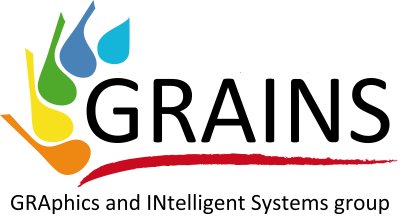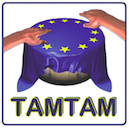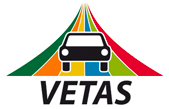| Filter by project leader: |
-
- EU project, 10/2011 - 11/2013TAMTAM "Exploiting the TIPTOE plAtforM by transferring ECVET and EQF semAntic tools in a Multi-sectoral perspective"LLP - Life Long Learning - LdV - Leonardo da Vinci - Transfer of Innovation (2011-1-IT1-LEO05-01969)
Project leader: Claudio DemartiniThe project identifies specific objectives and aims at enabling the young people to receive a training which comes through the local barriers, for example a virtual, geographical and sectoral mobility; but also they will allow to develop a real mutual trust among the workers/operators of the different contexts. The objectives are as follows: _ Representing a EQF level 5 qualification for each chosen sector according to a shared standard divided into two parts: common (described in terms of activities, tasks, performances and learning outcomes referred to competences) and subsidiary (through the national curriculum structured in terms of units and ECVET credit points allocated to them). ECVET tools for mobility are used for establishing links between HPE and VET qualifications. _ Uploading tasks and activities in the platform and capitalise the available data to carry out a benchmarking process on the standard effectiveness if compared with the labour market needs.The project identifies specific objectives and aims at enabling the young people to receive a training which comes through the local barriers, for example a virtual, geographical and sectoral mobility; but also they will allow to develop a real mutual trust among the workers/operators of the different contexts. The objectives are as follows: _ Representing a EQF level 5 qualification for each chosen sector ... - EU project, -MATCH "Informal and non-formal competences matching devise for migrants' employability and active citizenship"LLP - Life Long Learning - GRUNDTVIG (510739-LLP-1-2010-1-ITGRUNDTVIG-GMP)
Project leader: Claudio DemartiniThe core overall objective of the project is the development of a web-based functional tool (from test version to the dynamic working system) connecting the migrants' competences acquired in formal, non-formal and informal contexts to occupational profiles and to companies' labour demand. The system will be adopted by the Chambers of Commerce/training organizations involved in the present proposal as they are in a valuable position to serve as intermediaries in the local workforce development system, aggregating the labour needs of employers and effectively linking them with job seekers. The project is also aimed to: - to evaluate the existing tools and practices for validating informal non-formal learning and to offer the most practical and relevant ones based on the experience of the partners countries thus facilitating the process of validating non-formal and informal learning, with a focus on the needs of migrants; - to create, develop and propose the principles, methods and necessary conditions for the implementation of an experimental, integrated set of services, to be mainly addressed to migrants, for the recognition and validation of different forms of knowledge and skills, at all levels, whatever their source and whatever way they have been acquired; - to test the adapted web-tool on a representative sample of beneficiaries - end-users; - to offer integrated information, advice and assistance service to the beneficiaries (migrants as selected direct target group) by setting up "one-stop shops" in each Chamber of Commerce/training organisation involved; - to foster transnational and trans-sectoral collaboration building understanding and confidence in the tested practices and procedures.The core overall objective of the project is the development of a web-based functional tool (from test version to the dynamic working system) connecting the migrants' competences acquired in formal, non-formal and informal contexts to occupational profiles and to companies' labour demand. The system will be adopted by the Chambers of Commerce/training organizations involved in the present proposal as they are ... - EU project, -NQF-SQF "Common grounds for referencing NQFs and SQFs to the EQF"LLP - Life Long Learning - LdV - Leonardo da Vinci (EACEA-LLP-KA1EQF)
Project leader: Claudio Demartini"The overall aim of the project NQF-SQF is to create common grounds for referencing national qualifications frameworks and sectoral qualifications frameworks to the EQF (European Qualifications Frameworks), thereby providing for comparability of qualifications on the basis of learning outcomes defined in terms of abilities required by work processes. This shall be enabled by the use of an instrument to be developed within the project: the employability grid. This grid shall be applicable for the assessment of qualifications as well as for the evaluation of frameworks qualifications refer to. It shall test how far descriptions of frameworks and qualifications make visible what the learning outcomes of qualification processes are in terms of work process requirements, thus supporting employment at the European labour market. The instrument shall be used in order to draft typologies of national and sectoral frameworks, leading to recommendations for enhancing referenceability of frameworks, encompassing also a work process relationship criterion which can be added to the catalogue of referencing criteria already defined by the EQF Advisory Group. On the basis of this work, a model of future collaboration between private/public stakeholders at European level shall be drafted. The structure of collaboration shall be arranged around a nucleus of already collaborating stakeholders: the EQF Advisory Group and EQF national contact points.""The overall aim of the project NQF-SQF is to create common grounds for referencing national qualifications frameworks and sectoral qualifications frameworks to the EQF (European Qualifications Frameworks), thereby providing for comparability of qualifications on the basis of learning outcomes defined in terms of abilities required by work processes. This shall be enabled by the use of an instrument to be ... - project, -
 PIPIOT "Piattaforma Tecnologica Innovativa Per l’Internet Of Things"Regione Piemonte, "Regolamento di Esenzione 2009"
PIPIOT "Piattaforma Tecnologica Innovativa Per l’Internet Of Things"Regione Piemonte, "Regolamento di Esenzione 2009"
Project leader: Claudio DemartiniThe objective of the project is to design, implement and validate an innovative technological platform for the Internet of Things (IoT) capable to overcome the limitations of current market solutions and presenting, as main features, pervasiveness, transparency, portability, flexibility, context sensitivity, auto-adaptiveness and auto-configurability. The development of IoT solutions can bring significant improvements in many different application scenarios, by also contributing to the achievement of regional policies in the areas of environment, energy efficiency, process automation and quality of life.The objective of the project is to design, implement and validate an innovative technological platform for the Internet of Things (IoT) capable to overcome the limitations of current market solutions and presenting, as main features, pervasiveness, transparency, portability, flexibility, context sensitivity, auto-adaptiveness and auto-configurability. The development of IoT solutions can bring significant ... - EU project, -
 EQF-SECTOR "The relation between sectoral qualification and the European Qualification Framework (EQF)"2008-0157/AO/ECVL/TSK JB/SectoralQualifications/010/08
EQF-SECTOR "The relation between sectoral qualification and the European Qualification Framework (EQF)"2008-0157/AO/ECVL/TSK JB/SectoralQualifications/010/08
Project leader: Claudio DemartiniThe project aims at answering the following questions: Is there a need, triggered by the development of qualifications outside the domain of national systems or frameworks, to turn the EQF into a common reference point also for independent qualifications awarded by sectors and companies? What is required, in terms of mechanisms generating/enhansing mutual trust, to develop the EQF into a common meta-framework for all the qualifications, including those awarded outside national systems and frameworks?The project aims at answering the following questions: Is there a need, triggered by the development of qualifications outside the domain of national systems or frameworks, to turn the EQF into a common reference point also for independent qualifications awarded by sectors and companies? What is required, in terms of mechanisms generating/enhansing mutual trust, to develop the EQF into a common meta-framework ... - EU project, -VETAS "VET stakeholders of the automotive sector"LLP - Life Long Learning - LdV - Leonardo da Vinci (142793-LLP-1-2008-1-DE-LEONARDO-LNW)
Project leader: Claudio DemartiniToday's automotive sector is characterized by steadily ongoing work process innovations, by the development of global delivery networks, and by increasing competition. This yields a lot of requirements for the employees in terms of flexibility to cover the needs of this ever-changing world of work, or, in other words, the ability to cope with complex work requirements which can only be determined properly on the basis of a collaboration of all players in the field, as enterprises and employees, social partners, providers of training and education, public authorities. This situation delivers good arguments for setting up a framework of VET stakeholders in the automotive sector. There is no doubt that at the very end success in this field is only possible if stakeholders of various kind collaborate on the basis of the conviction that competition in the sector must not prevent benefits which can be gained by mutual exploitation of resources which have not to be considered as critical for achieving advantages over competitors. But this idea will only have an impact on behaviour if it can be shown practically at work level that cooperation in training, education, and human resources development enhances chances in global competition. Therefore the proposal aims to set up a network of practitioners and researchers which ensures the quality of training in a way that requirements of work processes are to a maximum degree matched by the abilities of employees to carry out their work. The major activities associated with this network to be initiated by the project at hand are: - The creation of a knowledge database with data on the situation of education and training in the automotive sector, provided for use by all stakeholders in the field- - Delivering an overview of methods of setting up occupational profiles and designing qualification processes. - Monitoring and evaluation of training approaches in the automotive sector at the national and European levels. - The identification of best practice models- - The creation of a forum of mutual exchange. - Preparation of policy recommendations. It is expected that these activities will contribute to the emergence of generally accepted training standards, which will both enhance the mobility of employees, who can work in various domains of various enterprises of various countries, and increase the flexibility of enterprises, who will have better opportunities to recruit properly trained staff in time.Today's automotive sector is characterized by steadily ongoing work process innovations, by the development of global delivery networks, and by increasing competition. This yields a lot of requirements for the employees in terms of flexibility to cover the needs of this ever-changing world of work, or, in other words, the ability to cope with complex work requirements which can only be determined properly on ... - EU project, 02/2008 - 01/2010
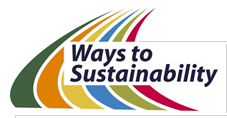 WAYS "Ways to sustainability"LLP - Life Long Learning - LdV - Leonardo da Vinci (137951-LLP-2007-DE-KA1EQF)
WAYS "Ways to sustainability"LLP - Life Long Learning - LdV - Leonardo da Vinci (137951-LLP-2007-DE-KA1EQF)
Project leader: Claudio DemartiniThe views of a big number of stakeholders on the EQF differ considerably in terms of understanding and focus of interest. But on the other hand the introduction of qualification frameworks at different levels (national, sectoral) require a good sustainable collaboration. It is suggested to describe ways how these problems can be solved by evaluating material already available for this purpose (statements, studies, projects, discussion platforms). In order to avoid a too generic approach (which could deliver only theoretical or abstract answers), the project shall follow a bottom-up approach which means that possible EQF/NQF/SQF application scenarios in a sector will be confronted with situations in relevant fields of educational policy at national, sectoral, and European level as far as they can be identified by using the above mentioned material, thus describing obstacles as well as favourable conditions of realizing the application of the above mentioned frameworks. Based on these enquiries, recommendations will be developed.The views of a big number of stakeholders on the EQF differ considerably in terms of understanding and focus of interest. But on the other hand the introduction of qualification frameworks at different levels (national, sectoral) require a good sustainable collaboration. It is suggested to describe ways how these problems can be solved by evaluating material already available for this purpose (statements, ... - project, -
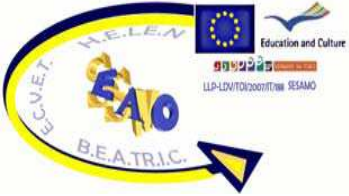 SESAMO "Simulating the implementation and supporting the start-up by exploiting HELEN and BEATRIC"LLP - Life Long Learning - LdV - Leonardo da Vinc (LLP-LDV/TOI/2007/IT/188)
SESAMO "Simulating the implementation and supporting the start-up by exploiting HELEN and BEATRIC"LLP - Life Long Learning - LdV - Leonardo da Vinc (LLP-LDV/TOI/2007/IT/188)
Project leader: Claudio DemartiniSince the establishment of the European Union, students' mobility has become a relevant topic in European legislation, but, while in Higher Education (HE) student transfers between Universities are a praxis, often in Vocational Education and Training (VET) they are still a declaration of intents: for instance, nowadays, for a VET student who wants to continue his/her study career abroad it is difficult to find, within courses descriptions, competences he/she need to achieve in order to obtain a given qualification. This difficulty arises from the heterogeneity of qualifications structure: in fact, two countries may show qualifications articulated in different ways, in which "contents" (learning outcomes) could be described heterogeneously. S.E.S.A.M.O. project was created to overcome this gap in qualification readability by developing a software platform exploiting a semantic engine, able to compare both the structure and the contents of national VET qualifications. Results achieved through such a platform could be possibly exploited to validate/integrate referencing mechanisms implemented by national actors, as well as a valuable means for supporting comparison of national qualifications in mobility scenarios.Since the establishment of the European Union, students' mobility has become a relevant topic in European legislation, but, while in Higher Education (HE) student transfers between Universities are a praxis, often in Vocational Education and Training (VET) they are still a declaration of intents: for instance, nowadays, for a VET student who wants to continue his/her study career abroad it is difficult to find, ... - project, -
 EASCMF "European Automotive Sector Competence Meta-Framework"(2006-4584/001-001)
EASCMF "European Automotive Sector Competence Meta-Framework"(2006-4584/001-001)
Project leader: Claudio DemartiniThe overall objective of the EASCMF project is to create conditions for setting up a sectoral competence framework for the European automotive sector. This European Automotive Sector Competence Meta-Framework can in turn serve as the starting point from which the proposed EQF can be applied to, and evaluated from, skilled work in the automotive sector, both by employers and by practitioners planning their career.The overall objective of the EASCMF project is to create conditions for setting up a sectoral competence framework for the European automotive sector. This European Automotive Sector Competence Meta-Framework can in turn serve as the starting point from which the proposed EQF can be applied to, and evaluated from, skilled work in the automotive sector, both by employers and by practitioners planning their ... - Regional project, -
 GAL-PMI "Anticipando Galileo: Prodotti e servizi a supporto della Mobilità e della sIcurezza"Regione Piemonte, DOCUP 2000-2006 Misura 3.4 Obiettivo 2
GAL-PMI "Anticipando Galileo: Prodotti e servizi a supporto della Mobilità e della sIcurezza"Regione Piemonte, DOCUP 2000-2006 Misura 3.4 Obiettivo 2
Project leader: Claudio DemartiniThe project refers to the availability of a satellite system (Galileo) which enables the localization and the possibility to introduce and use various services for mobility of people and vehicles, taking into account environmental, energy and transport problems.The project refers to the availability of a satellite system (Galileo) which enables the localization and the possibility to introduce and use various services for mobility of people and vehicles, taking into account environmental, energy and transport problems. - project, -
 ORSA-MINORE "Organizzazione delle ceRtificazioni con applicazione di Smart cArd nei MestIeri e nelle inNOvazioni del maRE"(I/06/B/F/PP-154178)
ORSA-MINORE "Organizzazione delle ceRtificazioni con applicazione di Smart cArd nei MestIeri e nelle inNOvazioni del maRE"(I/06/B/F/PP-154178)
Project leader: Claudio DemartiniThe area of ??intervention of the project is 'New trades of the sea and maritime transport'. The goals of the project are divided into three areas: promoting teh integration of young people in the labor market, support mobility in the fields of training and work) and inform the users (on employment opportunities and by publicizing and exploiting project results).The area of ??intervention of the project is 'New trades of the sea and maritime transport'. The goals of the project are divided into three areas: promoting teh integration of young people in the labor market, support mobility in the fields of training and work) and inform the users (on employment opportunities and by publicizing and exploiting project results). - project, -
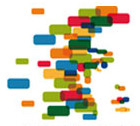 ECVET "Study on the feasibility of an ECVET system for apprentices (testing phase)"(EAC/64/05 2005-4996/001-001 PIL-PILOTP)
ECVET "Study on the feasibility of an ECVET system for apprentices (testing phase)"(EAC/64/05 2005-4996/001-001 PIL-PILOTP)
Project leader: Claudio DemartiniThe project identifies three specific components: 1) analysis of the obstacles related to transnational mobility; 2) assessing the implementation of ECVET related to already existing certification systems; 3) feasibility of implementing an operational point of view.The project identifies three specific components: 1) analysis of the obstacles related to transnational mobility; 2) assessing the implementation of ECVET related to already existing certification systems; 3) feasibility of implementing an operational point of view. - project, -
 EXPERO "Expectations and PERcerptions Of quality in VET"(I/05/B/F/PP-154171)
EXPERO "Expectations and PERcerptions Of quality in VET"(I/05/B/F/PP-154171)
Project leader: Claudio DemartiniAs it is necessary to increase adequateness of the VET to the demand of the territory, this project aims to create a model of analysis and comparison between expectations and perception of the received service. The model ServQual (Parasuraman, Berry and Zeithaml, 1988) is considered a basic theoretical approach to the model, intensively adopted by Public Administration (from health service to public services) in order to measure significant pointers for the received quality service. The ServQual model has been the first to establish a base for measurement of the service quality correlated not only to the perception itself, but to the customer expectations. The main limit is an higher displacement of the scale of the expectations. It could appear obvious that the evaluation of the received service is subjective (for instance queuing five minutes for a service could appear both a huge amount of time or a quick answer to somebody that according to previous expectations longed for few minutes).As it is necessary to increase adequateness of the VET to the demand of the territory, this project aims to create a model of analysis and comparison between expectations and perception of the received service. The model ServQual (Parasuraman, Berry and Zeithaml, 1988) is considered a basic theoretical approach to the model, intensively adopted by Public Administration (from health service to public services) ... - project, -
 VET-PROFESSIONAL "Vocational Educational Training PROFessionals: for a European Space of collaboratION And Learning"(I/05/B/F/PP-154149)
VET-PROFESSIONAL "Vocational Educational Training PROFessionals: for a European Space of collaboratION And Learning"(I/05/B/F/PP-154149)
Project leader: Claudio DemartiniThe project V.E.T. Prof.e.s.s.ion.a.l was born directly from the partners’ experiences in the chosen target sector that is the post-secondary non-university education and training system which is acquiring an ever increasing importance in the near future. The V.E.T. Prof.e.s.s.ion.a.l partners identified as the target group the education and training professionals who are directly or indirectly involved in the promotion and development of the target sector and who, beyond their primary function, education and training, contribute in the integration activity. The direct addressees of this proposal are the professionals with a significant experience in coordinating and tutoring training projects or possessing a set of competences functional to the development of this activity in the partners’ countries in the near future. The indirect addressees are represented by the group of stakeholders, who can mostly take advantage of the abovementioned activities of mediation and integration. We refer to the many and numerous categories of: learners, education and training bodies, enterprises, social partners and political decision makers.The project V.E.T. Prof.e.s.s.ion.a.l was born directly from the partners’ experiences in the chosen target sector that is the post-secondary non-university education and training system which is acquiring an ever increasing importance in the near future. The V.E.T. Prof.e.s.s.ion.a.l partners identified as the target group the education and training professionals who are directly or indirectly involved in ... - EU project, -
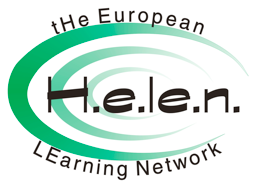 HELEN "tHe European LEarning Network"LDV (I/04/B/F/NT-154056)
HELEN "tHe European LEarning Network"LDV (I/04/B/F/NT-154056)
Project leader: Claudio DemartiniThe HELEN-project has been established with the general aim to build a transnational network to develop instruments to make transparency between the VET-systems of different countries within reach of those who need it, e.g. students, workers and VET-teachers. Specifically, HELENs objectives are: 1. to favour mobility of workers and students, by comparing qualifications and qualification systems at the conceptual level and by developing instrumental solutions for creating transparency; 2. to implement a transnational network; 3. to promote social dialogue among policy makers and partners, among partners and their networks at local level and/or at transnational level.The HELEN-project has been established with the general aim to build a transnational network to develop instruments to make transparency between the VET-systems of different countries within reach of those who need it, e.g. students, workers and VET-teachers. Specifically, HELENs objectives are: 1. to favour mobility of workers and students, by comparing qualifications and qualification systems at the ...
